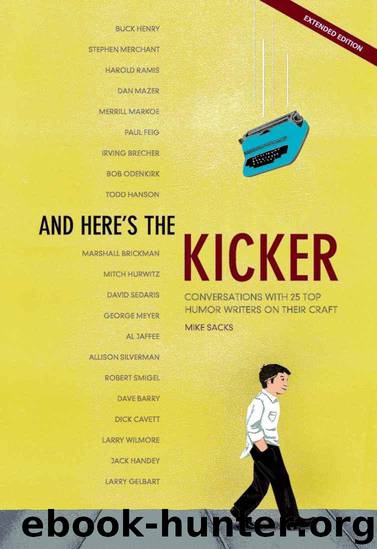And Here's the Kicker: Conversations With 21 Top Humor Writers on Their Craft by Mike Sacks

Author:Mike Sacks
Language: eng
Format: mobi, epub
Tags: Linguistics, Humorists, Humor, Parodies, Interviews, Satire And Humor, Creative writing, Composition & Creative Writing, Comedy, Form, Creative writing & creative writing guides, Wit and humor, Composition & Creative Writing - General, Authorship, Literacy, Language Arts & Disciplines, Usage & Writing Guides, Language, American, Language Arts, Comedy - Authorship, Humour, Reference, General, Wit and humor - Authorship
ISBN: 9781582975054
Publisher: F & W Pubns Inc
Published: 2009-07-08T05:00:00+00:00
George Meyer
George Meyer's “Suicide Note Dos and Don'ts”
Do curse the living.
Don't recommend movies or restaurants.
Do mention a “hidey-hole” of gold coins.
Don't pin the suicide note to your shirt. It looks desperate.
For two weeks in 2002, TV writer George Meyer gave rare public performances at a West Hollywood theater, co-starring in a play (which he also wrote and directed) called Up Your Giggy. Between sketches, Meyer delivered monologues that took aim at many of his favorite targets, including advertising (“an insane, diabolical siren song dragging us all to a horrific Koyaanisqatsi”), God (“a ridiculous superstition, invented by frightened cavemen”), and, of course, marriage (“a stagnant cauldron of fermented resentments, scared and judgmental conformity, exaggerated concern for the children, dull weekends in Santa Barbara, and the secret dredging-up of erotic images from past lovers in a desperate and heartbreaking attempt to make spousal sex even possible”). For Meyer's longtime fans, it was further proof that their comedy idol hadn't lost any of his decidedly caustic wit over the years.
Dissecting cherished institutions such as family and religion was nothing new for Meyer. Since 1989, he's been one of the most revered and celebrated writers on The Simpsons. Though it was “Life in Hell” cartoonist Matt Groening who first conceived the show (initially as a series of shorts on The Tracey Ullman Show from 1987 to 1989), Meyer is largely considered among the writing staff to be its behind-the-scenes genius among geniuses. If you need further proof, just read any newspaper or magazine article about The Simpsons. There will most likely be a quote from a Simpsons writer, explaining how Meyer is, more often than not, responsible for the best lines and jokes.
To truly understand Meyer's satiric worldview, however, it's necessary to take a closer look at the Simpsons episodes attributed solely to him. As pointed out in the 2004 The Believer interview with Meyer, his episodes tend to share the following common theme: A character giving up on an “institution or belief system.” It could be Homer deciding that he doesn't want to go to church anymore (“Homer the Heretic,” 1992, Episode Three), or Bart walking out on a family holiday (“Bart vs. Thanksgiving,” 1990, Episode Seven), or even Lisa — the character whom Meyer, a fellow vegetarian and environmentalist, most identifies with — losing faith in the American political system (“Mr. Lisa Goes to Washington,” 1991, Episode Three). The Simpsons may have originally been based on Matt Groening's family, but their hearts and souls belong to Meyer.
Meyer's distrust of authority (political, religious or parental) began at a young age. Born in Pennsylvania in 1956 and raised mostly in Tucson, Arizona, Meyer was the oldest of eight children in a family of strict Roman Catholics. He's often remarked that his Catholic upbringing was difficult — “It wound my spring almost to the breaking point,” he told Believer. He attended Harvard University in the mid-seventies to pursue a degree in biochemistry, but somewhere along the way got wooed by comedy. He became president of
Download
And Here's the Kicker: Conversations With 21 Top Humor Writers on Their Craft by Mike Sacks.epub
This site does not store any files on its server. We only index and link to content provided by other sites. Please contact the content providers to delete copyright contents if any and email us, we'll remove relevant links or contents immediately.
Asking the Right Questions: A Guide to Critical Thinking by M. Neil Browne & Stuart M. Keeley(5762)
Autoboyography by Christina Lauren(5228)
Eat That Frog! by Brian Tracy(4526)
Dialogue by Robert McKee(4389)
Sticky Fingers by Joe Hagan(4188)
Journeys Out of the Body by Robert Monroe(3619)
Annapurna by Maurice Herzog(3464)
Full Circle by Michael Palin(3443)
Schaum's Quick Guide to Writing Great Short Stories by Margaret Lucke(3376)
Elements of Style 2017 by Richard De A'Morelli(3343)
The Art of Dramatic Writing: Its Basis in the Creative Interpretation of Human Motives by Egri Lajos(3062)
Atlas Obscura by Joshua Foer(2955)
Why I Write by George Orwell(2945)
The Fight by Norman Mailer(2930)
The Diviners by Libba Bray(2927)
In Patagonia by Bruce Chatwin(2922)
The Mental Game of Writing: How to Overcome Obstacles, Stay Creative and Productive, and Free Your Mind for Success by James Scott Bell(2904)
Venice by Jan Morris(2568)
The Elements of Style by William Strunk and E. B. White(2470)
